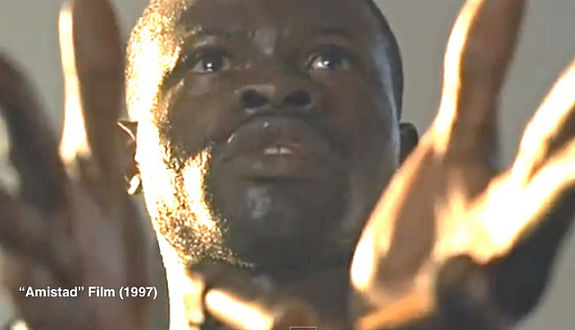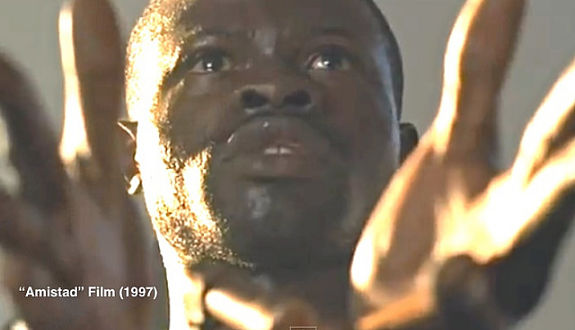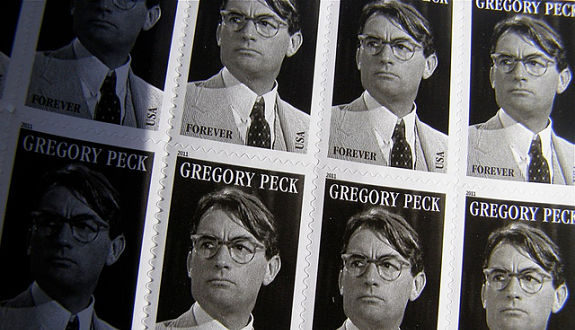
Movie lawyers have battled discrimination, hate speech, corporate malfeasance, political corruption, and even Santa skepticism. It is hard to imagine a court case with higher stakes, however, than that at the center of #24 on the ABA Top 25.
Amistad
1997 dir. Steven Spielberg
In 1839, a group of kidnapped West Africans were being transported to America as slaves on the Spanish vessel “La Amistad.” In the middle of the night, they managed to pick the locks on their chains and overthrow their captors. As dramatized by Steven Spielberg, the revolt was a heroic act of resistance, but the freedom the men and women won only extended from bow to stern. Adrift in a new world, and at the mercy of the navigational treachery of the two Spaniards they left alive to steer them home, they soon found themselves running aground in America. There, they were embroiled in a court case that would determine their fate and challenge the judiciary to stand up to the illegal slave trade.
If that doesn’t sound like the makings of a thrilling and important lawyer movie, I don’t know what does. And in the hands of Spielberg, America’s greatest historical sentimentalist, Amistad makes for a pretty rousing lawyer movie.
The leader of the revolt is Cinque, played with great strength and dignity by Djimon Hounsou. He was famous back home for having once killed a rampaging lion by nailing it with a rock. The beasts he faces on his transatlantic voyage and in the American courts are more ruthless.
Cinque and the other 43 kidnapped Africans do have some American allies: principally, Roger Sherman Baldwin (Matthew McConaughey), a property lawyer, and Theodore Joadson (Morgan Freeman) a fictionalized abolitionist. Together, they help devise a defense that raises interesting questions about the relationship of morality and the law. Baldwin, a pragmatist and a newcomer to the abolitionist cause, frames the case in strictly legal terms: the “Amistad Africans” were not born slaves in Cuba, as their surviving Spanish captors claim, but rather kidnapped as free men and women from West Africa. Since by 1839, the transatlantic slave trade had been abolished by international treaty (though “homegrown” slavery continued legally for years), Baldwin argues that the defendants were never actually slaves to begin with, so they were within their rights to kill the traders who were illegally kidnapping them.
Joadson, on the other hand, sees the case in more moral terms: slavery is an abomination and an affront to the founding ideals of both Christianity and America. Ultimately, Baldwin’s strategy wins out, and the case is argued the premise not that slavery is wrong but that the defendants were never legally slaves to begin with. Baldwin’s effectiveness as counsel stems from his ability to dehumanize the case and see it in strictly legal terms. Over the course of the trial, though, and in particular through conversation with Cinque, Baldwin comes to understand the deeper moral issue involved, the now obvious notion that people are, inalienably, people, not property.
That’s a pretty classic Hollywood set-up for this kind of movie, and it’s no surprise that it turns out to be not entirely accurate. Baldwin was, in reality, an abolitionist from the beginning. His come-to-Jesus arc gives the movie a convenient dramatic vehicle for a “slavery was wrong” message, but it displaces focus from the Africans to their white “saviors.”
“As in Glory,” wrote historian Eric Foner in an essay about the movie’s liberty-taking, “Amistad’s black characters are essentially foils for white self-discovery and moral growth.” Moreover, Spielberg paints an anachronistic picture of race relations in the 1840s. In reality, Joadson (had he existed) would not have been allowed to sit alongside his white colleagues in court, and John Quincy Adams, who makes an emotional argument for abolition when the case is appealed to the Supreme Court in the film’s third act, actually had a “solid record of indifference and callousness toward the plight of black Americans” that earned him the scorn of Massachusetts abolitionists.
There is one sequence in Amistad, however, in which Spielberg doesn’t sugar-coat. Testifying before the court, Cinque recalls what he witnessed during the middle passage across the Atlantic: torture, mass murder, and despair. Spielberg recreates these atrocities, letting them speak for themselves, and the results are immersive and haunting. As in the Normandy beach-storming scene in Saving Private Ryan, Spielberg’s skill as a filmmaker here sharpens rather than softens the horrors of history.
There are a few excellent moments in the courtroom, as well. For each witness that takes the stand, Spielberg intercuts the direct- and cross-examinations, a neat trick that gives the scenes a dreamlike quality. In a few sequences, the courtroom is de-familiarized, shown from the defendants’ perspective. Spielberg reveals the utter strangeness of our judicial system, the ritual pageantry and elaborate systems of rules: the trial becomes Kafkaesque. At one point, it gets to be too much for Cinque and he simply stands up and shouts (in his first utterance in English): “Give us free.” He’s saying: We’re human beings. But he’s also saying: What kind of system is this, that you people spend two years arguing legal technicalities instead of just doing the right thing?
So, while “Amistad” is certainly worth watching, it gives the American judiciary more credit than it’s due. The same Supreme Court that found in favor of the Amistad captives issued the Dred Scott decision just a few years later.




